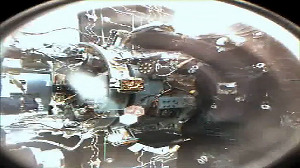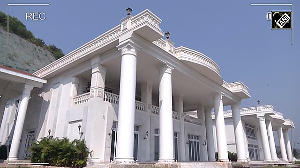Unlike the usual fanfare seen in the media, the Interim Budget this year has been a low-key affair. Everyone seems to be disappointed.
However, there are no valid reasons for either the 'experts' to get disappointed with the lack of new schemes or for the stock market index to look downwards. In many ways, the minister in charge has laid bare what was already known about the emperor.
The income and expenditure statement has confirmed that there is not much fiscal space for a stimulus and any additional stimulus would be the responsibility of the government that will come to power after elections.
In fact, the Interim Budget has more to do with revising the income-expenditure statement of the government for 2008-09 rather than preparing the income-expenditure plan for 2009-10.The budget confirms the sharp increase in revenue and fiscal deficits, which has been feared all along. For 2008-09, the revenue deficit relative to GDP which was estimated at 1 per cent of GDP is now estimated at 4.4 per cent, and the fiscal deficit now is estimated at 6 per cent as against 2.5 per cent in the budget estimate.
To this, we need to add the off-budget liabilities arising from oil and fertilizer bonds amounting to Rs 95,942 crore and that works out to 1.8 per cent of GDP.
With the states being allowed an additional half a per cent of GSDP fiscal deficit which would be about 3 per cent of GDP, the consolidated fiscal deficit including off-budget liabilities will come close to 11 per cent of GDP.
The revision in the income expenditure statement has been significant and that too was expected. In fact, there is a shortfall of Rs 59,766 crore in the gross tax revenue of the Centre from the budget estimate for the current fiscal.
Of this, the reduction in the revenue available for the Centre is over Rs 41,180 crore (Rs 411.8 billion) and the states will receive a lower devolution of Rs 18,586 crore (Rs 185.86 billion).
As a ratio of GDP, the shortfall in gross tax revenue works out to 1.1 per cent and tax revenue accruing to the Centre will be lower by 0.8 per cent.
On the expenditure side, the revised estimate is higher by Rs 150,000 crore (Rs 1,500 billion) or 2.8 per cent of GDP. Of this, the predominant proportion of 2.7 per cent of GDP is on revenue expenditure.
The important items include subsidies (1.1 per cent of GDP), pay revision, the loan waiver programme and additional allocation to Bharat Nirman and various flagship schemes.
In fact, these numbers are a consolidation of the two supplementary demands for grants presented in October and December, 2008. Although a significant part of these additional expenditures is due to under-provision in the budget estimates, the additional expenditures do increase aggregate demand and can be taken to provide fiscal stimulus.
In that sense, although unintended, the stimulus during the year has been quite significant, almost 2.8 per cent of GDP on the expenditure side and over 1 per cent of GDP on the revenue side. By the same token, a higher level of expenditure of 2008-09 will continue into the next year as well and will continue to provide the stimulus.
Once the elections are over, the incoming government can decide and provide whatever additional stimulus is feasible.
Not surprisingly, there has been a lot of disappointment in various quarters that the Interim Budget has not introduced further stimulus.
The major reason is that, irrespective of the question of propriety, there is hardly any fiscal room for providing an additional stimulus, the government having introduced additional cash expenditures this year amounting to almost 2.8 per cent of GDP, of which 2.7 per cent is in the revenue account with immediate impact on aggregate demand.
Although the inflation rate is not an immediate problem, additional borrowing could drive up the interest rates and crowd out private sector investment.
In India, unlike in the US or Japan where additional private investment will not be forthcoming even at zero rate of interest, the reduction in the rate of interest would certainly enhance investment demand.
The need of the hour is to create conditions for private sector revival and that cannot be achieved by additional spending financed by more borrowing. Indeed, the monetary policy window is still open and the Reserve Bank can act swiftly if needed to reduce the repo and reverse repo rates as well as the CRR.
When the SLR stipulates that 24 per cent of the demand and time liabilities of the banks should be invested in government securities, there is no need for a 5 per cent CRR.
Whichever government comes to power, it will have a challenging task of working out the fiscal stimulus programme.
Indeed, for the next four months, until the the new government takes office, macroeconomic policies will have to be calibrated mainly by monetary policy. The time, however, can be employed usefully by the major political parties to work out a package.
The Interim Budget, while providing for the existing programmes, has estimated the revenue deficit at 4 per cent of GDP and fiscal deficit at 5.5 per cent. The lower crude oil prices provide additional space as the government may not have to make provision for oil and fertilizer bonds.
That would leave the new government an additional 2.5 per cent of GDP to spend even if it decides to keep the size of the fiscal deficit at the current year's level.
Indeed, as has been pointed out often, the spending departments in the governments should immediately draw up their action plans and prioritise their spending to expeditiously complete the projects in the pipeline.
This will not only enhance aggregate demand but will also increase the size of the multiplier by easing infrastructure bottlenecks.
The Interim Budget speech this year reads like a report card. After all, the government will begin its election campaign by touting the achievements.
Indeed, the new government will have a challenging task of reviving the economy, but hopefully, it will convert the challenge into an opportunity.
M Govinda Rao is director, National Institute of Public Finance and Policy







 © 2025
© 2025